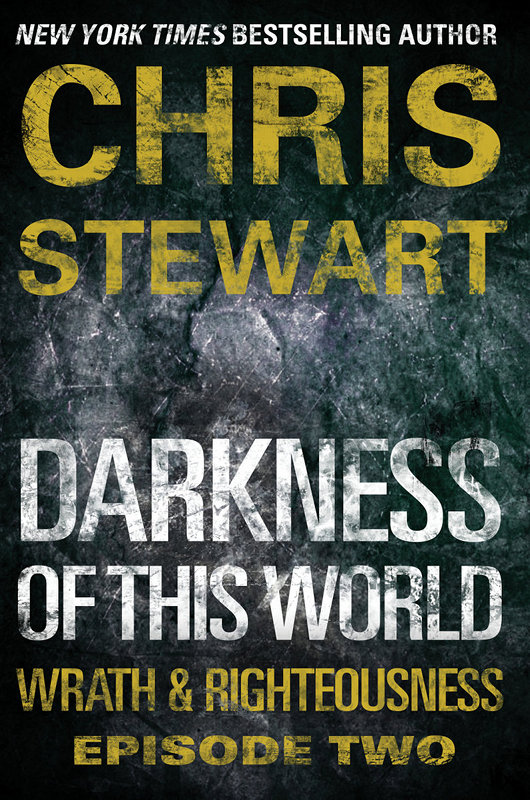Wrath & Righteousnes Episodes 01 to 05 (20 page)
Read Wrath & Righteousnes Episodes 01 to 05 Online
Authors: Chris Stewart

The large man fixed the air vent to blow on his face as he listened, then answered again. “Yes, your Highness, I agree. I have come to the reluctant conclusion that it might work. It seems that no one knows, or at least no one cares any longer, that Rassa Pahlavi is a grandson of the shah. He lives a quiet life, a simple life. And though I pray it never happens, and I hope you are wrong (blessed be your name, your Royal Highness, for I do not mean to ever disagree!), but from what I have seen I believe your plan could possibly work.
If
we are careful. And if we are left with no choice.”
* * *
A little more than seven hundred kilometers to the west, the crown prince of the House of Saud, future king of Saudi Arabia, thanked his loyal servant then hung up the phone. He stared a long moment, considering what he should do.
Was he that close? Was it real? Was the danger as near as he feared?
He knew that it was. And there was no time to hesitate any longer. He needed to put his plan into action.
He huffed with emotion, then picked up his secure phone again. “When will General Brighton be here?” he asked.

WRATH & RIGHTEOUSNESS
[Episode Two]
CHRIS STEWART

This book is a work of fiction. Any references to historical events, real people, or real locales are used factiously. Other names, characters, places and incidents are the product of the author’s imagination, and any resemblance to actual events or locals or persona, living or dead, is entirely coincidental.
Mercury Radio Arts, Inc.
1133 Avenue of the Americas
New York, NY 10036
Original Edition © The Shipley Group Inc. (Published by Deseret Book Company)
Condensed Edition © 2012 The Shipley Group Inc. (Published by Mercury Radio Arts, Inc. under license from Deseret Book Company)
All rights reserved, including the right to reproduce this book or portions thereof in any form whatsoever.
Cover design by Richard Yoo

QED stands for Quality, Excellence and Design. The QED seal of approval shown here verifies that this eBook has passed a rigorous quality assurance process and will render well in most eBook reading platforms.
For more information please
click here
.
ONE“For we wrestle not against flesh and blood,
but against principalities, against powers,
against the rulers of the darkness of this world…”
Ephesians 6:12
Karachi, Pakistan
The Palestinian moved through the crowd easily for he was comfortable here. Although he was not among his own people, the sounds and scents were the same. He felt the constant press of flesh against him, the movement of the crowd, the chatty voices of women and the terse growls of men, too busy, too arrogant, too grand to respond to their wives. He smelled the tang of old bodies and felt the gritty dirt on his feet. He felt the uneven pavement beneath him and the white hot, oppressive glare of the sun, wringing great drops of sweat from under his arms and around the small of his back. Everyone sweats in Karachi; they sweat to keep cool, and they sweat to survive. No one was clean in Karachi. It was just the way it was.
The Palestinian moved around a brown and rusted cement hole in the sidewalk, one of the public toilets that was built without the benefit of even a curtain for privacy. He moved through the crowd, working his way toward a small open-air market half a mile down the street. In the distance, he heard a series of gunfire and a replying series of gunfire, but he paid no attention for it was almost a full block away, and gunfire in Karachi could be heard daily. In any given day, six people lost their lives to petty thieves, gang wars, drug runners, hate or revenge. The slave trade that flourished on the outskirts of the city fed the dangerously high murder rate, but also a significant contributor to the local economic machine. Teenage Afghan, Chinese, India and Pakistani captives were harbored in Karachi before being shipped off to brothels throughout the Pacific Rim. Even as he walked, the Palestinian passed a group of three teenage girls bound together. For thirty
dinre
he could have bought any one of them.
Stopping on the corner, the Palestinian waited for the traffic. He glanced quickly around him, turning his back on the street to look in the direction from which he had come. To his side, a roughly mortared brick wall sported an old movie poster. Tom Cruise smiled at him, his long black hair drooping over his eye. The Palestinian frowned, and turned around. A break came in the traffic and he crossed the street.
Ten minutes later, he sat down at a wooden table at an outdoor café. The owner moved toward him, then recognized his face and instead turned for the kitchen. Seconds later, he emerged with a mug of hot
cheka
tea in hand.
“Amid,” the owner said as he placed the small cup on the table. “God be blessed, you are safe. It is good to see you again.”
The Palestinian, a tall man with dark eyes and enormous ears, nodded to the restaurateur. “How is your fish?”
“Very fresh,
Sayid,
” the owner lied.
The Palestinian grunted and pointed to his plate. The restaurateur nodded and moved through an open door and into his kitchen.
Minutes later, the Palestinian was eating his meal: a charcoaled slab of sea trout, with its head and bones still intact, and a bowl of white rice with hot mustard sauce. The crowd thronged around him, moving up and down the street. An occasional automobile passed by, forcing pedestrians onto the narrow sidewalk and around the small tables of the outdoor café. A group of children played in the street, gleefully chasing each other. A mule pulled a decrepit wagon with one wheel on the sidewalk and the other on the street.
Halfway through the Palestinian’s meal, a Pakistani man emerged from the crowd, approached and sat down without saying a word. In contrast to the Palestinian, who was dressed in a traditional flowing
dakish
, the Pakistani was dressed in black slacks and an open white shirt. Neither of the men was distinguishable in the crowd.
As the Pakistani sat down, Amid looked up and held his fork to his mouth.
The Pakistani lit up a cigarette. “Amid Safi Mohammad, how is your meal?” he asked.
Amid Mohammad didn’t answer, but pushed in another forkful of fish. The Pakistani watched him chew, then leaned forward in his chair. Mohammad pulled away as he caught the whiff of cologne. He studied the Pakistani, then wiped his mouth with the back of his hand. “Brother, I have to disagree with you on this meeting place,” he said in a heavy voice. “I don’t believe it is wise.” The Palestinian paused and glanced to the sky, almost as if he expected to see an American satellite hovering there. His eyes darted down the street. “The rats have eyes, eyes like spiders, they can see everything.”
The Pakistani nodded. He appreciated his fellow warrior’s fear. But they were in his territory now, and he was not concerned. This was his city, his territory, his tribe controlled everything and he knew every movement of the American spies. His crew had identified every one of them and kept each under a close watch, and yes, the Americans got around, but he also had evidence that they were not watching today.
He dramatically crushed out his cigarette. “Mohammad, you have to trust me,” he answered knowingly while nodding almost imperceptibly to the roof of a squat cement building on the other side of the street. “The Great Satan has many eyes, but this is my lair. We are safe here, I assure you, my people are near. That is, of course, unless you allowed yourself to be followed . . . ,” the Pakistani’s voice trailed off. The accusation was clear.
“No, no,” Amid Safi Mohammad quickly replied. “I was careful. I followed your instructions to the letter.”
“All right then.” The Pakistani sat back and picked at his teeth. “Now, let’s get it done.”
Amid Mohammad pushed his dirty plate aside. “This will be our last meeting. Our work is almost complete.”
“Good. I agree. It has been a dreadfully long year.”
“You have done very well, doctor. My people are pleased.”
The Pakistani only nodded. If Mohammad only knew! If he had any idea what the Pakistani had gone through! For more than eighteen years, he had lived on a knife’s edge, a simple breath away from being discovered. He wanted this over. It was time to relax and enjoy his money. He took a deep breath and forced a thin smile. “The arrangements for the final delivery have been made,” he said. “All we have left to do is to transfer the money.”
The Palestinian nodded. “How is your memory?” he asked.
The Pakistani frowned. “Not good, as you know.”
“Then get a pencil.”
The Pakistani reached quickly into his pocket and pulled out a small pencil. He grabbed a napkin as the Palestinian started to speak.
“The payment will be deposited into an account drawn on the Soloman Bank of Malaysia. The account number will be forwarded to you by private messenger later tonight. The withdrawal instructions and authentication codes are authenticate zulu, one, four, whiskey seventy-nine—that’s seventy-nine, not seven nine—then today’s date and my birthday.”
The Pakistani scribbled furiously.
“The money will only remain in the account for three minutes,” the Palestinian continued. “That’s three minutes, Dr. Atta, not one second more. If you haven’t transferred the money out of the account within the three-minute window, we will repossess it and move it ourselves, and if that happens, it is over. Our business is done. We will have the hardware and you won’t have anything.”
The Pakistani looked up and frowned. “That will not be necessary,” he answered defiantly. “I will make the transfer, don’t you worry about that.”
The Palestinian glanced down the street. “I’m not worried, Doctor Atta, but the instructions from my client are clear.”
The Pakistani nodded. Amid went on. “Our people at the bank will be monitoring every transfer. Once the money has been deposited into this first account, you will immediately move the money into another account at the same bank. A second messenger will provide you with the specifics pertaining to this account. Once again, the money will remain there three minutes. Three minutes to make your transfer or we take possession again. From there, you will move the money into twelve separate accounts drawn on various banks in the Philippines. After that, you are on your own. We wash our hands of the paper trail.”
The Pakistani looked up from his paper. “And the messengers?” he asked.
“Same men as before. You will recognize them both.”
The Pakistani sat back and pulled out another cigarette. “Fifty million?” he confirmed.
